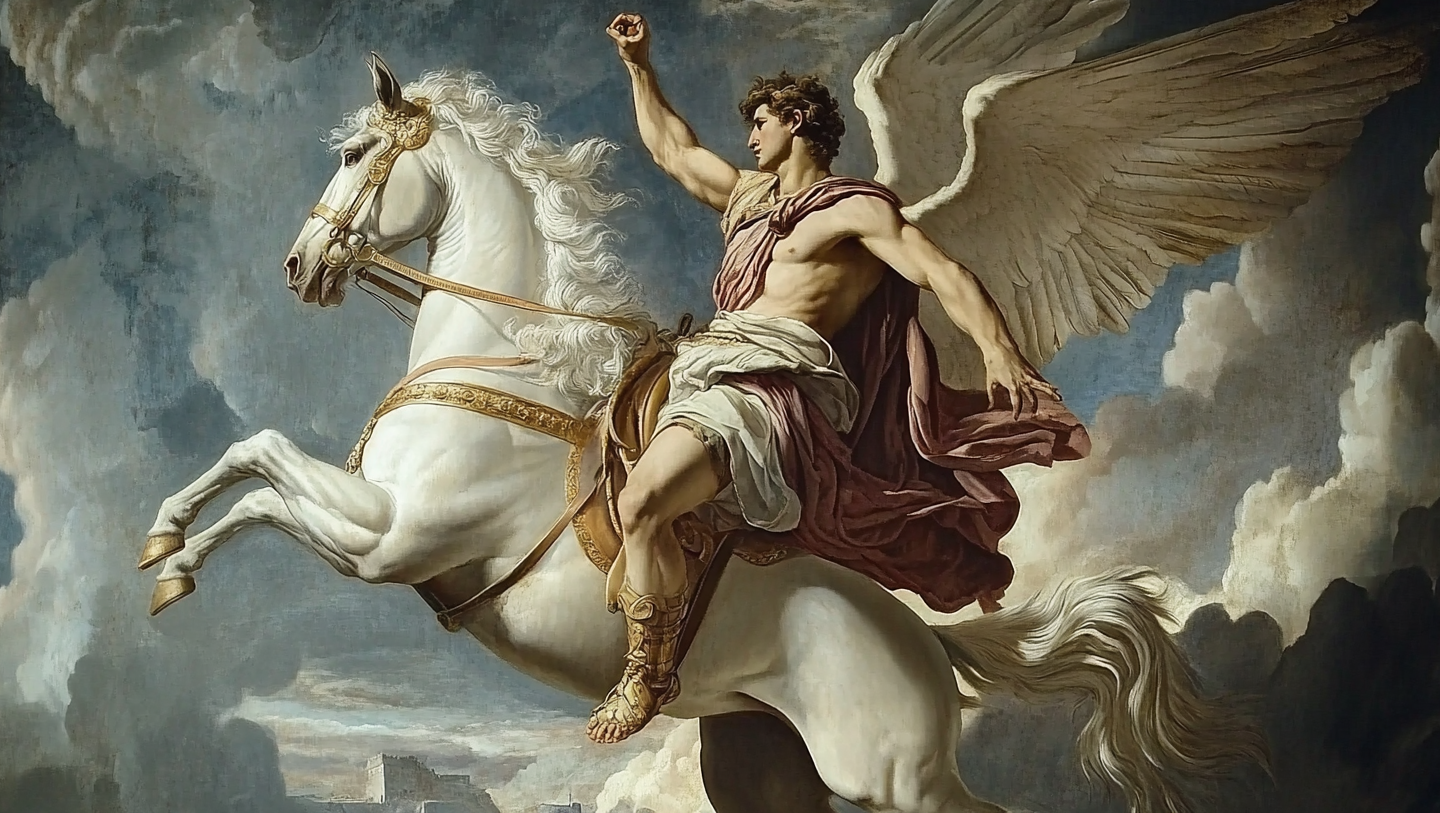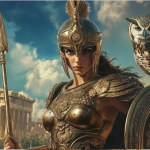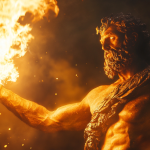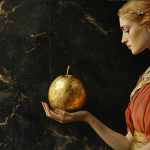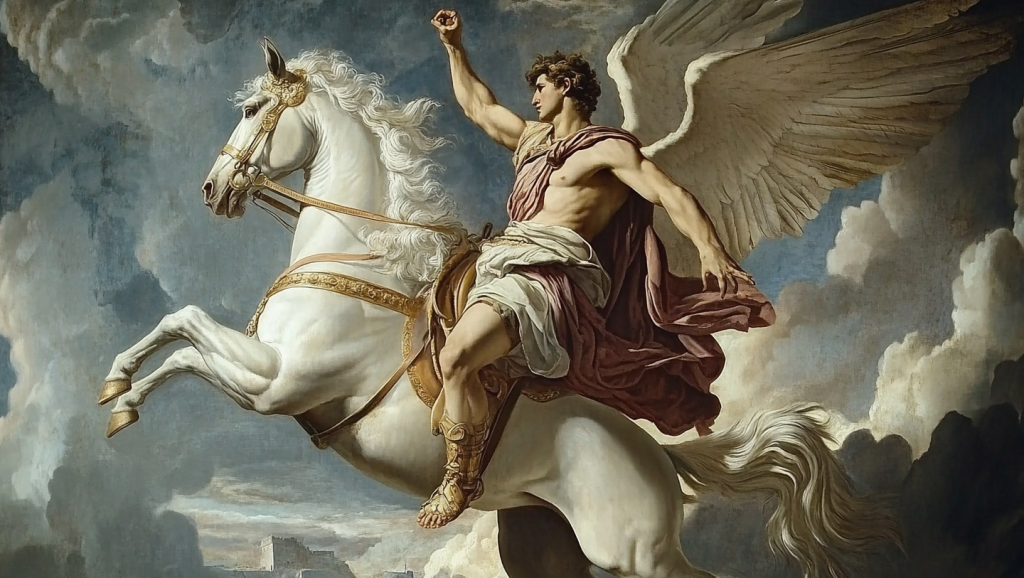
Greek mythology is filled with extraordinary heroes and mythical creatures, but few stories are as fascinating as that of Bellerophon and his faithful winged companion, Pegasus. Bellerophon, a brave and determined mortal, set out to conquer impossible challenges, while Pegasus, the divine winged horse, played a crucial role in his heroic feats. Their partnership led to one of the greatest victories in Greek legend—the defeat of the monstrous Chimera. However, their story also serves as a warning against hubris, a common theme in Greek myths.
Bellerophon and Pegasus’ tale is not only about triumph but also a reminder of the delicate balance between human ambition and the gods’ will.
The Birth of Pegasus
Pegasus was no ordinary horse. Born from the blood of the gorgon Medusa when she was slain by the hero Perseus, Pegasus emerged fully formed, a majestic creature with wings that allowed him to soar through the skies. His divine origins made him a rare and powerful being, and it was believed that he was favored by the gods, especially Zeus, who would later entrust him with carrying thunderbolts.
For many years, Pegasus roamed free, a symbol of untamed beauty and strength, until he met the one mortal capable of taming him—Bellerophon.
Bellerophon’s Early Life and Exile
Bellerophon was the son of Glaucus, the king of Corinth, and was known for his courage and noble spirit. However, his life took a dark turn when he accidentally killed his brother, leading him to seek purification in the court of King Proetus of Tiryns. Despite his innocence, tragedy followed Bellerophon. The king’s wife, Queen Stheneboea, falsely accused him of making advances toward her after he rejected her. Furious but unwilling to kill Bellerophon directly due to his guest rights, King Proetus sent him on a seemingly impossible mission, hoping that it would lead to his death.
The Impossible Task: Slaying the Chimera
King Proetus tasked Bellerophon with slaying the Chimera, a fearsome fire-breathing monster that terrorized the kingdom of Lycia. The Chimera had the body of a lion, the head of a goat on its back, and the tail of a serpent—making it a nearly invincible beast. To defeat such a monster seemed impossible for any man.
However, Bellerophon received divine assistance. The seer Polyidus advised him that the only way to defeat the Chimera was to ride the winged horse Pegasus. But taming Pegasus was no small feat.
The Taming of Pegasus
Determined to complete his task, Bellerophon prayed to the goddess Athena for guidance. In response, Athena appeared to him in a dream, offering him a golden bridle and instructing him on how to find and tame Pegasus. Upon waking, Bellerophon discovered the bridle and set off to find the elusive winged horse.
He found Pegasus drinking from the spring of Peirene in Corinth. With Athena’s bridle, Bellerophon was able to approach the magnificent creature and, to his amazement, Pegasus allowed him to place the bridle over his head. From that moment on, the bond between Bellerophon and Pegasus was forged, and together, they became an unstoppable force.
Defeating the Chimera
With Pegasus at his side, Bellerophon took to the skies to face the Chimera. The battle was fierce—while flying above the Chimera, Bellerophon used a spear to attack the beast from the air, avoiding its deadly flames. Knowing the Chimera’s fire was its greatest weapon, Bellerophon cleverly attached a block of lead to his spear. He thrust it into the Chimera’s throat, and when the beast breathed fire, the lead melted, suffocating the monster from within.
With the Chimera dead, Bellerophon returned victorious, hailed as a hero in Lycia. But his journey was far from over.
The Trials of Bellerophon
After defeating the Chimera, Bellerophon went on to accomplish many more heroic feats. King Iobates of Lycia, initially sent to kill him, gave him additional tasks, hoping that one would eventually end in Bellerophon’s death. These included defeating the Solymi warriors and the Amazons—both of which Bellerophon accomplished with the help of Pegasus.
Eventually, Iobates, recognizing Bellerophon’s divine favor, abandoned his attempts to kill the hero and instead honored him. He offered Bellerophon his daughter’s hand in marriage, and Bellerophon’s fame spread across the land.
Bellerophon’s Downfall: The Dangers of Hubris
Though Bellerophon was a mighty hero, his story did not end in triumph. Overcome by pride and a desire to ascend to the heavens, Bellerophon decided to fly to Mount Olympus, the home of the gods, on the back of Pegasus. This act of hubris—believing that a mortal could live among the gods—was an affront to Zeus.
Zeus, angered by Bellerophon’s arrogance, sent a gadfly to sting Pegasus. The winged horse, startled by the sting, bucked Bellerophon off his back, sending him plummeting to the earth. Although Bellerophon survived the fall, he was crippled and lived out the rest of his life in misery and exile, forever regretting his overreach.
Pegasus’ Fate
After the fall of Bellerophon, Pegasus returned to the service of Zeus. He was honored by the king of the gods and given the role of carrying Zeus’s thunderbolts. Later, in recognition of Pegasus’ loyalty, Zeus placed him among the stars as the constellation Pegasus, forever immortalizing the winged horse in the night sky.
The Legacy of Bellerophon and Pegasus
The story of Bellerophon and Pegasus is a reminder of both the heights of heroism and the dangers of hubris. Bellerophon’s early adventures, especially the defeat of the Chimera, demonstrated his valor and ingenuity, qualities that made him one of Greece’s most revered heroes. Yet, his downfall serves as a warning that even the greatest of mortals must respect the boundary between human and divine.
Pegasus, meanwhile, became a symbol of freedom, inspiration, and divine favor. The image of a winged horse continues to inspire artists, poets, and dreamers, reminding us of the power of imagination and the endless possibilities when one is lifted by both skill and grace.
Through their journey, Bellerophon and Pegasus taught the Greeks that while great deeds are possible with courage and divine aid, true wisdom lies in knowing one’s limits.

